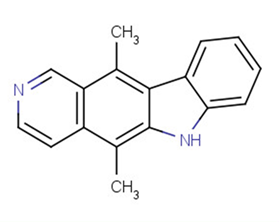
Ellipticine
CAS No. 519-23-3
Ellipticine( CCG-36483 | CCG36483 | CCG 36483 | DB-052047 )
Catalog No. M17531 CAS No. 519-23-3
Ellipticine is a potent antineoplastic agent exhibiting multiple mechanisms of action.
Purity : >98% (HPLC)
 COA
COA
 Datasheet
Datasheet
 HNMR
HNMR
 HPLC
HPLC
 MSDS
MSDS
 Handing Instructions
Handing Instructions
| Size | Price / USD | Stock | Quantity |
| 5MG | 42 | Get Quote |


|
| 10MG | 65 | Get Quote |


|
| 25MG | 107 | Get Quote |


|
| 50MG | 158 | Get Quote |


|
| 100MG | 236 | Get Quote |


|
| 500MG | 578 | Get Quote |


|
| 1G | Get Quote | Get Quote |


|
Biological Information
-
Product NameEllipticine
-
NoteResearch use only, not for human use.
-
Brief DescriptionEllipticine is a potent antineoplastic agent exhibiting multiple mechanisms of action.
-
DescriptionEllipticine is a DNA intercalating agent and a DNA topoisomerase II inhibitor. Ellipticine is also a natural product, isolated in 1959 from the Australian evergreen tree of the Apocynaceae family. Ellipticine was found to be an extremely promising anticancer drug. The planar polycyclic structure was found to interact with DNA through intercalation, exhibiting a high DNA binding affinity (10(6) M(-1)). The presence of protonatable ring nitrogens distinguished ellipticine from other simple intercalators. Both monocationic and uncharged species were found to be present under physiological conditions. The positive charge stabilized the binding of ellipticine to nucleic acids, while the more lipophilic uncharged compound was shown to readily penetrate membrane barriers. The structural nature of these compounds offers a plausible basis for the implication of multiple modes of action, including DNA binding, interactions with membrane barriers, oxidative bioactivation and modification of enzyme function; most notably that of topoisomerase II and telomerase.
-
In VitroEllipticine (NSC 71795) is a potent antineoplastic agent exhibiting the multimodal mechanism of its action. The mechanisms of Ellipticine (NSC 71795) antitumor, mutagenic and cytotoxic activities are suggested to be intercalation into DNA and inhibition of DNA topoisomerase II activity. Another mode of Ellipticine (NSC 71795) action is the formation of covalent DNA adducts mediated by its oxidation with cytochromes P450 (CYP) and peroxidases. Ellipticine (NSC 71795) can also act as an inhibitor or inducer of biotransformation enzymes, thereby modulating its own metabolism leading to its genotoxic and pharmacological effects. Treatment of cells with Ellipticine (NSC 71795) results in inhibition of cell growth and proliferation. This effect is associated with formation of two covalent Ellipticine (NSC 71795)-derived DNA adducts.
-
In VivoEllipticine (NSC 71795) treatment results in Ellipticine (NSC 71795)-derived DNA adduct generation in several healthy organs (liver, kidney, lung, spleen, breast, heart and brain) and in DNA of mammary adenocarcinoma. The levels of Ellipticine (NSC 71795)-derived DNA adducts generated in these adenocarcinomas are almost 2-fold higher than in normal healthy mammary tissue. The induced expression of cytochrome b5 protein in liver of rats treated with Ellipticine (NSC 71795) suggests that cytochrome b5 may modulate the CYP-mediated bioactivation and detoxification of Ellipticine (NSC 71795).
-
SynonymsCCG-36483 | CCG36483 | CCG 36483 | DB-052047
-
PathwayAngiogenesis
-
TargetVEGFR
-
RecptorTopo II
-
Research AreaCancer
-
Indication——
Chemical Information
-
CAS Number519-23-3
-
Formula Weight246.31
-
Molecular FormulaC17H14N2
-
Purity>98% (HPLC)
-
SolubilityDMSO : 5.8 mg/mL. 23.55 mM;
-
SMILESc12c(c(c3c(c2C)ccnc3)C)c2c([nH]1)cccc2
-
Chemical Name5,11-dimethyl-6H-pyrido[4,3-b]carbazole
Shipping & Storage Information
-
Storage(-20℃)
-
ShippingWith Ice Pack
-
Stability≥ 2 years
Reference
1. Savorani C, et al. Leuk Lymphoma. 2015 Mar;56(3):739-47.
molnova catalog



related products
-
Cabozantinib (S-mala...
Cabozantinib (XL184) is a potent, multi-kinase inhibitor that inhibits VEGFR2, c-Met, Kit, Axl and Flt3 with IC50 of 0.035, 1.3, 4.6, 7 and 11.3 nM, respectively.
-
Semaxanib
Semaxanib (SU5416) is a potent and selective VEGFR(Flk-1/KDR) inhibitor with IC50 of 1.23 μM.
-
Anlotinib Dihydrochl...
Anlotinib also known as AL3818 is a receptor tyrosine kinase (RTK) inhibitor with potential antineoplastic and anti-angiogenic activities.



 Cart
Cart
 sales@molnova.com
sales@molnova.com


